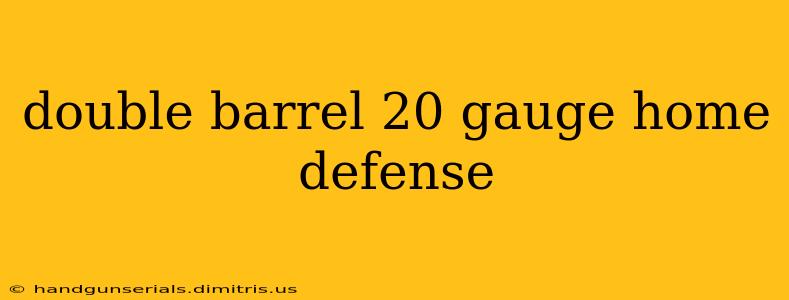Choosing a home defense shotgun is a serious decision, demanding careful consideration of various factors. While many opt for pump-action or semi-automatic shotguns, the double-barrel 20 gauge deserves a closer look. This guide delves into the pros and cons of using a double-barrel 20 gauge for home defense, helping you determine if it's the right choice for you.
Why Consider a Double Barrel 20 Gauge?
The double-barrel 20 gauge offers a unique set of advantages in a home defense scenario:
-
Simplicity and Reliability: Double-barrel shotguns are inherently simple, with fewer moving parts than their pump-action or semi-automatic counterparts. This translates to exceptional reliability, crucial in a high-stress situation where malfunctions can be catastrophic. They are less prone to jamming or malfunctioning, even with less-than-perfect ammunition.
-
Compactness and Maneuverability: A 20-gauge double barrel is generally more compact and lighter than a 12-gauge, making it easier to maneuver in tight spaces common in homes. This is especially important when navigating hallways, doorways, or stairs.
-
Reduced Recoil: The 20 gauge's lighter recoil compared to the 12 gauge can be advantageous for smaller individuals or those less experienced with shotguns. Controlled recoil is vital for accurate follow-up shots.
-
Two Shots Ready: The immediate availability of two shots is a significant advantage. In a home invasion, having two rounds ready to fire can be the difference between neutralizing a threat and being overwhelmed.
Disadvantages of a Double Barrel 20 Gauge for Home Defense
While the double-barrel 20 gauge presents compelling advantages, certain drawbacks need careful consideration:
-
Limited Ammunition Capacity: The most significant drawback is the limited ammunition capacity of only two shots. Once those two shots are fired, the shotgun must be reloaded, a process that can take valuable seconds in a life-or-death situation.
-
Slower Reload Time: Reloading a double-barrel shotgun is slower than cycling a pump-action or semi-automatic. This longer reload time can leave you vulnerable if the initial two shots don't neutralize the threat.
-
Potential for Overpenetration: While the 20 gauge offers less recoil, it still has the potential for overpenetration, particularly with certain types of ammunition. This is a crucial concern when considering home defense, as stray shots could injure innocent bystanders. Careful ammunition selection is paramount.
Ammunition Considerations
Choosing the right ammunition is critical for effective home defense. For a 20-gauge shotgun, consider:
- Buckshot: Offers a wide spread of pellets, ideal for close-quarters combat.
- 00 Buckshot: A good balance between stopping power and reduced overpenetration compared to larger buckshot sizes.
- Birdshot: Generally not recommended for home defense due to its lower stopping power.
Always practice with your chosen ammunition to become proficient with its recoil and spread pattern.
Training and Practice
Regardless of the firearm you choose, proper training is non-negotiable. Familiarize yourself thoroughly with your double-barrel 20 gauge's operation, including safe handling, loading, unloading, and malfunction clearing. Regular practice at the shooting range is essential to maintain proficiency and develop the skills needed for accurate and controlled shooting under pressure.
Conclusion
The double-barrel 20 gauge shotgun can be a viable option for home defense, particularly for individuals who prioritize simplicity, reliability, and reduced recoil. However, its limited capacity and slower reload time are significant drawbacks that must be carefully weighed against its advantages. Ultimately, the best home defense shotgun is the one you are most comfortable and proficient with, coupled with extensive training and responsible gun ownership practices. Consult with firearms experts and law enforcement professionals to ensure you make the most informed decision for your specific needs and circumstances.

